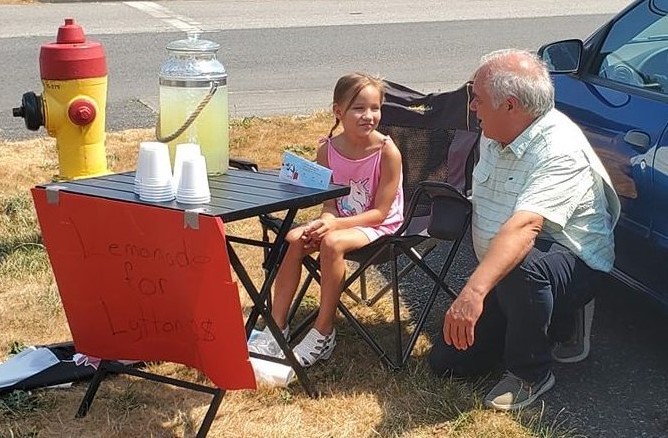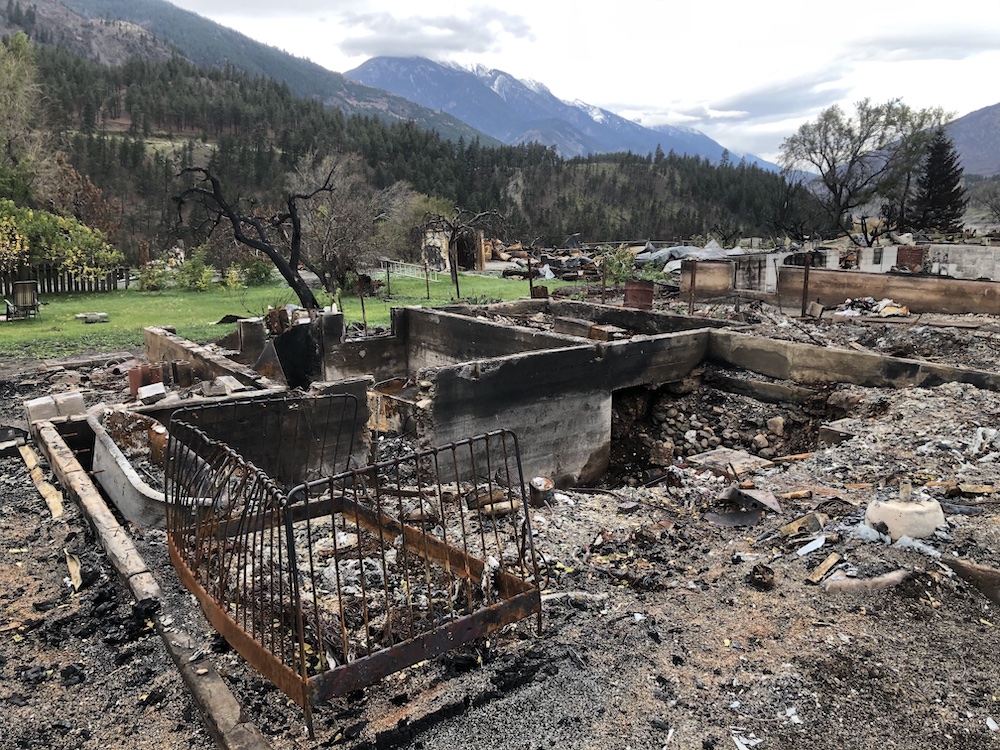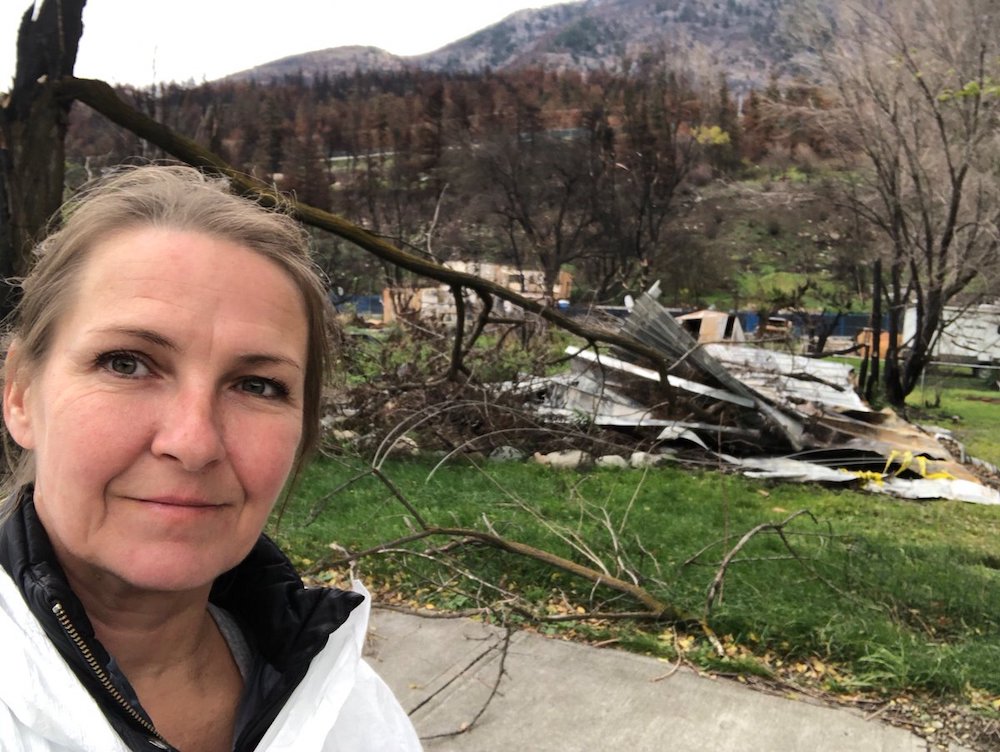“This evacuation has been long and hard. It’s taken a toll on all residents, including myself,” said Mayor Jan Polderman Monday night at Lytton’s first town hall since a wildfire in June destroyed most of the village and almost 40 homes in Lytton First Nation. The fire killed two people and caused an estimated $78 million in insured damages.
“We know many of you are hurting and frustrated. We want to know where we go from here and how to plan your lives,” Polderman said in his opening remarks. “I want to assure Lytton residents and all members of the wider Lytton community that the village council is committed to rebuilding Lytton and ensuring community members input is at the core of the planning and rebuild process.”
But the community has not been at the centre of the process so far, said Lytton property owner Jennifer Thoss. She spoke to The Tyee from Tsawwassen ahead of the meeting. The Monday town hall should have happened within the first week after the fire, and a community hub should have been set up for people to meet, she said.
“Having that community involvement is so paramount,” said Thoss who lost her property and a number of rental units in the fire.
An estimated 1,000 residents from Lytton and its surroundings have dispersed to dozens of cities across the province including Langley, Uclulet, Burnaby and Williams Lake.
Thoss worries that further delays in recovery and decisions that don’t involve the community could push people to not return. “We’ve already lost people really,” she said. “Core community members have bought in other places. Elders are not planning on coming back.”
When hell came to Paradise
Three years ago to the day of Lytton’s town hall, Susan Dobra lost everything in a wildfire that ripped through Paradise, California on Nov. 8, 2018. “We lost our home, and our neighbourhood was flattened and pretty much most of the town.” The Camp fire, as it was named, was one of the deadliest and most destructive wildfires in California’s history; at least 85 people died and over 18,000 structures were destroyed.
“Having community at the centre of your recovery is so important,” Dobra said at the Festival of What Works in a Nov. 3 session called After the Fire: Community Wisdom Following Devastation. Survivors from Paradise and other disasters joined the online workshop to share what they’ve learned since the fire and what it’s been like navigating a rebuild of their community.
After the fire in Paradise there was a huge diaspora, remembers Dobra. But the town was able to come together to start recovery efforts and push for a community-led vision for the future. Their recovery efforts continue to this day. Dobra is also vice-chair of Regenerating Paradise, a non-profit community group helping to facilitate the rebuilding of the surrounding community.
Having a physical place where people can go to find community, “share resources, share stories, hug each other, find clothes, figure out who needs a place to live,” is crucial, she said.

“People literally ran” after the fire and there wasn’t time to set up a list of where people went, said Mayor Polderman from Kamloops. Throughout the summer, there were fires all over British Columbia. “Some people have been relocated three, four times now,” making it a challenge to keep track of everyone.
Not having a central meeting place for Lyttonites is “a major bone of contention,” said Thoss. In July she organized a fundraiser for a Lytton resident who lost everything, including his two dogs in the fire. She was overwhelmed with the response and received a 40-by-12-foot shelter trailer from PCL Construction.
She said she offered the trailer to the Village of Lytton and Emergency Management BC to set up in town. She believes there are lots of local options that haven’t been considered, and if they have been considered, the process hasn’t been explained to residents. “We need the village to be vibrant. We need the village to grow. We need the community to have a hub there.”
Mayor Polderman said they’ve received lots of donations with nowhere to put them. An evacuation order remains for the Village of Lytton with a few exceptions. It’s still not possible to set up a site right in town as most of the foundations are burned, there’s currently no electricity, no water and they still need to check the sewer pipes, he said.
The site is contaminated with hazards like asbestos, arsenic, lead, dioxins and furans according to a report released in September by Emergency Management BC. “Basically what they have determined is that in order to clean up the site, they’re going to scrape the top three inches off of all the properties,” said Polderman.
Decontamination of the waste and its removal has started, said Polderman. But about 45 per cent of residents don’t have insurance. So the village is working with the provincial government and NGOs to finance the estimated $4 to $9.5 million cleanup cost for the uninsured, said Polderman.
The draft short-term recovery plan published in October mentions Lytonnites have shared their frustrations with the lack of community consultation and involvement on “multiple occasions.” It recommends that “a resilience centre could also be opened immediately and stay open for the years to come as a one-stop-shop for residents to gather information on recovery and services available.”
The plan also sets a goal of having the village office open by winter 2021 as a “physical office location is an important part of restoring faith in leadership for residents.”
An aftermath of questions
The Camp fire destroyed Allen Myers’ family home in Paradise, California. It took every home he ever played in as a kid. It destroyed the school he went to and the hospital he was born in.
Myers yearned for connection and found it with others who were also grieving and wondering how to move on. “I would speak to the loss and show up with questions. What do we do now? Now that this is the reality, what’s next?”

There were dozens of questions from Lyttonites at the Monday town hall. Over 160 people logged on to the Zoom call.
People shared frustrations of dealing with different levels of bureaucracy to access recovery funds, the delay in getting clean water and interim housing. Participants asked how youth could get involved with the rebuild and how health, ambulance and postal services would continue.
For many questions, there were no direct answers; mostly assurances that the issue was on the long list of priorities.
Brad Vis, Conservative MP for Mission-Matsqui-Fraser Canyon said Canada Post would not confirm a date that they would be back in the community. “Too many bureaucratic hold ups,” tweeted Lytton resident Sarah Brown in reaction to more delays in access to services. “All residents currently drive two hours to Kamloops to get mail.”
“We are dependent on the provincial government and the federal government to basically do anything,” Mayor Polderman told The Tyee. “I may wish to set up a resiliency centre, and set up aid agencies and whatever else. I don’t have the funds to even do that.”
Polderman said his team is small and his position is a part-time job that pays about $20 a day. A resilience centre is not a top priority at the moment, he said. His main focus right now is health care, postal services, groceries and clean drinking water.
It’s an enormous task, but there are people committed to rebuilding and returning to Lytton. Some residents have already started and others are virtually meeting with their former neighbours to push for community needs.
Parliamentary secretaries Jennifer Rice and Roly Russell have recently been appointed by the provincial government to work with the village on their recovery. Emergency Management BC specialists work “daily with the village and the Lytton First Nation on recovery planning, providing advice and support,” a spokesperson for the provincial agency told The Tyee.
Thoss believes a strong team has been put together to help lead the rebuild but says it’s hard to feel hopeful until she sees tangible changes on the ground.
“We’re just getting people parachuted in, which is great to support our council, but really, we need to be getting community members involved with the rebuild,” said Thoss. “Because they’re the ones that know the community and what we want.”
The Village of Lytton is putting together an advisory planning committee of eight to 10 members of the public. The committee will be appointed by mayor and council with the mandate to address planning and recovery issues, listen to community members, businesses and other agencies and provide recommendations to the mayor and council.
“It all begins by listening to you; the residents, the businesses, non-profit organizations, volunteers and so many more people,” said Coun. Robert Leitch at the town hall, who will chair the advisory planning committee.
In the wake of the fire, Indigenous and community-led relief centres were set up to provide donated groceries, clothing or just have coffee without the support of any level of government, wrote Sarah Brown in a letter to Prime Minister Justin Trudeau. The letter was in response to the prime minister’s comments at COP26 describing Lytton in the past. “In Canada, there was a town called Lytton. I say ‘was’ because on June 30, it burned to the ground,” the prime minister stated.
“The community spirit of Lytton did not burn with it. If anything, I would argue that the spirit of Lytton is stronger than it was before the fire... there is no ‘was’ in Lytton — the heart of the town, the people and the passion, is still there,” wrote Brown.
The spring after the fire in Paradise, Myers returned home. While most of the town was destroyed, an apple orchard where he played as a kid remained largely saved. He remembers watching as the trees bloomed. “In that moment, it brought me to a place where I could see life coming back there. That was a starting point; and it’s just a blossom on an apple tree.”
It’s easy to get wrapped up in all the tasks that need doing next, said Myers. But it’s important to create time and space for grief and hope.
“If we’re just racing around to get the next task done, we’re going to miss that opportunity to grieve, we’re going to miss that opportunity to catch the apple blossom.” ![]()
Read more: Rights + Justice, Municipal Politics, Environment

















Tyee Commenting Guidelines
Comments that violate guidelines risk being deleted, and violations may result in a temporary or permanent user ban. Maintain the spirit of good conversation to stay in the discussion.
*Please note The Tyee is not a forum for spreading misinformation about COVID-19, denying its existence or minimizing its risk to public health.
Do:
Do not: